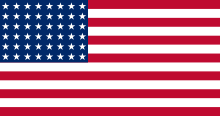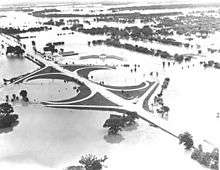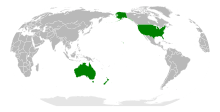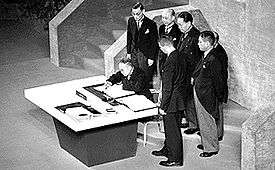1951 in the United States
| 1951 in the United States | |
|---|---|
| Years: | 1948 1949 1950 – 1951 – 1952 1953 1954 |
|
| |
 48 stars (1912–59) | |
|
Timeline of United States history
| |
Events from the year 1951 in the United States.
Incumbents
Federal Government
- President: Harry S. Truman (D-Missouri)
- Vice President: Alben W. Barkley (D-Kentucky)
- Chief Justice: Fred M. Vinson (Kentucky)
- Speaker of the House of Representatives: Sam Rayburn (D-Texas)
- Senate Majority Leader: Scott W. Lucas (D-Illinois) (until January 3), Ernest McFarland (D-Arizona) (starting January 3)
- Congress: 81st (until January 3), 82nd (starting January 3)
Events
January–March

March 29: Ethel and Julius Rosenberg convicted
- January 1 – First week as No. 1 single on Billboard and Cashbox charts of Patti Page hit song "Tennessee Waltz".
- January 10 – The new United Nations headquarters officially opens in New York City.
- January 17 – Korean War: Chinese and North Korean forces capture Seoul.
- January 27 – Nuclear testing at the Nevada Test Site begins with a 1-kiloton bomb dropped on Frenchman Flat, northwest of Las Vegas.
- January 31 – The last daily narrow gauge passenger train "The San Juan Express" is retired by the Denver and Rio Grande Western Railroad.
- February 4–8 – Surgeons remove an ovarian cyst from Gertrude Levandowski in a 96-hour-long operation in Chicago. She loses almost half of her weight and emerges weighing 140 kg.
- February 6 – A Pennsylvania Railroad passenger train derails near Woodbridge Township, New Jersey, killing 85 people and injuring over 500, in one of the worst rail disasters in American history.
- February 27 – The Twenty-second Amendment to the United States Constitution, limiting Presidents to two terms, is ratified.
- March 2 – The first NBA All-Star Game of basketball is played in the Boston Garden.
- March 3 or 5 – Jackie Brenston "and His Delta Cats" (actually Ike Turner's Kings of Rhythm) record "Rocket 88" at Sam Phillips' Sun Studio in Memphis, Tennessee, a candidate for the first rock and roll record (released in April). It is covered on June 14 by Bill Haley and His Saddlemen.
- March 6 – Second Red Scare: Ethel and Julius Rosenberg stand trial facing charges of conspiracy to commit espionage.
- March 7 – Korean War – Operation Ripper: In Korea, United Nations troops led by General Matthew Ridgeway begin an assault against the Chinese "volunteers".
- March 12 – Hank Ketcham's best-selling comic strip Dennis the Menace, appeared in newspapers across the U.S. for the first time.
- March 14 – Korean War: For the second time, United Nations troops recapture Seoul.
- March 29
- Second Red Scare: Ethel and Julius Rosenberg are convicted of conspiracy to commit espionage. On April 5 they are sentenced to receive the death penalty.
- Rodgers and Hammerstein's The King and I opens on Broadway and runs for 3 years. It's the first Rodgers & Hammerstein musical specifically written for an actress (Gertrude Lawrence). Lawrence is stricken with cancer during the run of the show and dies halfway through its run a year later. The show makes a star of Yul Brynner.
- The 23rd Academy Awards ceremony is held; All About Eve wins Best Picture and four others.
- March 31 – Remington Rand delivers the first UNIVAC I computer to the United States Census Bureau.
April–June

July 13: The Great Flood of 1951 reaches its peak
- April 11 – U.S. President Harry S. Truman relieves General Douglas MacArthur of his Far Eastern commands.
- May 3 – The U.S. Senate Committee on Armed Services and U.S. Senate Committee on Foreign Relations begins its closed door hearings into the dismissal of General Douglas MacArthur by U.S. President Harry S. Truman.
- May 9 – Operation Greenhouse: The first thermonuclear weapon is tested on Enewetak Atoll in the Marshall Islands, by the United States.
- May 12 – The United States releases an H-bomb on an atoll called Eniwetok.
- May 21 – The Ninth Street Show, formally known as the 9th Street Art Exhibition, a gathering of a number of notable artists, marks the stepping-out of the post war New York avant-garde, collectively known as the New York School.
- June 14 – UNIVAC I is dedicated by the U.S. Census Bureau.[1]
- June 15–July 1 – In New Mexico, Arizona, California, Oregon, Washington, and British Columbia, thousands of hectares of forests are destroyed in fires.
- June 18 – Battle Ground, Washington is incorporated.
July–September

September 1: ANZUS Treaty
- July 10 – Korean War: Armistice negotiations begin at Kaesong.
- July 11–12 – Cicero race riot of 1951: A mob of 4,000 whites attack an apartment building housing a single black family in a neighborhood in Cicero, Illinois.
- July 13
- The Great Flood of 1951 reaches its highest point in Northeast Kansas, culminating in the greatest flood damage to date in the Midwestern United States.
- MGM's Technicolor film version of Show Boat, starring Kathryn Grayson, Ava Gardner, and Howard Keel, premieres at Radio City Music Hall in New York City. The musical brings overnight fame to bass-baritone William Warfield (who sings Ol' Man River in the film).
- July 14 – In Joplin, Missouri, the George Washington Carver National Monument becomes the first United States National Monument to honor an African American.
- July 16 – J. D. Salinger's coming-of-age story The Catcher in the Rye is published by Little, Brown and Company in New York City.
- July 17 – Western New England College in Springfield, Massachusetts is chartered.
- July 26 – Walt Disney's 13th animated film, Alice in Wonderland, premieres in London, United Kingdom.
- July 30 – David Lean's Oliver Twist is finally shown in the United States, after 10 minutes of supposedly anti-Semitic references and closeups of Alec Guinness as Fagin are cut. It will not be shown uncut in the U.S. until 1970.
- September 1 – The United States, Australia and New Zealand all sign a mutual defense pact, called the ANZUS Treaty.
- September 3 – The American soap opera Search for Tomorrow debuts on CBS. After over 30 years, the show switches to NBC on March 26, 1982. Search for Tomorrow airs its final episode on December 26, 1986.
- September 8
- Treaty of San Francisco: In San Francisco, 48 nations sign a peace treaty with Japan to formally end the Pacific War.
- Japan-U.S. Security Treaty, which allows United States Armed Forces being stationed in Japan after the occupation of Japan, is signed by Japan and the United States.
- September 18 – Tennessee Williams's adaptation of A Streetcar Named Desire premieres, becoming a critical and box-office smash.
- September 20 – NATO accepts Greece and Turkey as members.
October–December

September 8: Treaty of San Francisco officially ends war with Japan
.jpg)
December 1951 ad for Nash Ambassador
- October 3 – "Shot Heard 'Round the World": One of the greatest moments in Major League Baseball history occurs when the New York Giants' Bobby Thomson hits a game winning home run in the bottom of the 9th inning off of Brooklyn Dodgers pitcher Ralph Branca, to win the National League pennant after being down 14 games.
- October 4
- MGM's Technicolor musical film, An American in Paris, starring Gene Kelly and Leslie Caron, premieres in New York. It was directed by Vincente Minnelli. It would go on to win 6 Academy Awards, including Best Picture.
- Shoppers World (one of the first shopping malls in the U.S.) opens in Framingham, Massachusetts.
- October 15 – I Love Lucy made its television debut on CBS.
- October 16 – Judy Garland begins her legendary concerts in New York's Palace Theatre.
- October 17 – CBS' Eye logo premieres on TV.
- October 20 – The Johnny Bright Incident occurs in Stillwater, Oklahoma.
- October 24 – U.S. President Harry Truman declares an official end to war with Germany.[2]
- November 1 – The first military exercises for nuclear war, with infantry troops included, are held in the Nevada desert.
- November 10 – Direct dial coast-to-coast telephone service begins.
- November 22 – Paramount Pictures releases George Pal science fiction film When Worlds Collide.
- November 24 – The Broadway play Gigi opens, starring little known actress Audrey Hepburn as the lead character.
- November 28 – The film Scrooge, starring Alastair Sim, premieres in the U.S. under the title of Charles Dickens's original novel, A Christmas Carol.
- c. December – The Institute of War and Peace Studies is established by Dwight D. Eisenhower at Columbia University in New York (of which he is President) with William T. R. Fox as first director.[3]
- December 13 – A water storage tank collapses in Tucumcari, New Mexico, resulting in 4 deaths, and 200 buildings destroyed.
- December 17 – "We Charge Genocide", a petition describing genocide against African Americans, is delivered to the United Nations.
- December 20 – Experimental Breeder Reactor I (EBR-1), the world's first (experimental) nuclear power plant, opens in Idaho.
- December 23 – John Huston's drama film, The African Queen, starring Humphrey Bogart and Katharine Hepburn, premieres in Hollywood.
- December 24 – Gian Carlo Menotti's 45-minute opera, Amahl and the Night Visitors, premieres live on NBC, becoming the first opera written especially for television.
- December 31 – The Marshall Plan expires after distributing more than $13.3 billion USD in foreign aid to rebuild Europe.[4]
Ongoing
- Cold War (1945–1991)
- Second Red Scare (1947–1957)
- Marshall Plan (1948–1951)
- Korean War (1950–1953)
Births
January
- January 12 – Kirstie Alley, actress
- January 22 – Leon Roberts, baseball player
- January 23 – Michael R. Matz, horse rider and trainer
- January 27
- Seth Justman, rock keyboardist (The J. Geils Band)
- Ken Timbs, wrestler (died 2004)
- January 30 – Charles S. Dutton, actor
February
- February 4 – Phil Ehart, drummer (Kansas)
- March 1 – Deb Fischer, Senator for Nebraska
- March 24 – Tommy Hilfiger, fashion designer
April
- April 5 – Phillip Garrido, criminal
- April 21 – Tony Danza, actor
May
- May 9
- Jorie Graham, poet
- Joy Harjo, poet
- May 12 – Joe Nolan, baseball player
- May 14 – Robert Zemeckis, film director, producer and screenwriter.
- May 20 – Mike Crapo, U.S. Senator from Idaho from 1999
- May 21
- Al Franken, U.S. Senator for Minnesota from 2009
- Bob Gale, film screenwriter, producer and director
- May 26 – Sally Ride, first American woman in space (died 2012)
- May 30 – Stephen Tobolowsky, actor
June
- June 3 – Jill Biden, wife of Joe Biden, Second Lady of the United States
- June 5 – Suze Orman, author
July
- July 5 – Roger Wicker, Senator for Mississippi
- July 8
- Alan Ashby, baseball player
- Anjelica Huston, actress
- July 21 – Robin Williams, actor (d. 2014)
- July 24 – Lynda Carter, actress
- July 28 – Anthony A. Williams, lawyer and politician, 5th Mayor of the District of Columbia
August
- August 24 – Orson Scott Card, writer
- August 27 – Robert Torricelli, U.S. Senator from New Jersey from 1997 to 2003
September
- September 2
- Mark Harmon, actor
- Jim DeMint, U.S. Senator from South Carolina from 2005 to 2013
- September 9 – Tom Wopat, actor
- September 18 – Ben Carson, neurosurgeon
- September 25 – Mark Hamill, actor
October
- October 18 – Terry McMillan, writer
- October 29 – Dirk Kempthorne, U.S. Senator from Idaho from 1993 to 1999
November
- November 11 – Kim Peek, savant (d. 2009)
- November 14
- Frankie Banali, drummer and songwriter
- Sandahl Bergman, actress, singer, and dancer
- Alec John Such, bassist
- November 25
- Bucky Dent, baseball player and manager
- Bill Morrissey, singer-songwriter (d. 2011)
- November 27 – Kathryn Bigelow, film director
December
- December 2 – Adrian Devine, baseball player
Deaths
- January 10 – Sinclair Lewis, novelist (born 1885)
- April 23 – Charles G. Dawes, 30th Vice President of the United States from 1925 to 1929 (born 1865)
- May 7 – Warner Baxter, actor (born 1889)
- May 29 – Fanny Brice, singer (born 1891)
- August 14 – William Randolph Hearst, newspaper magnate (born 1863)
- August 28 – Robert Walker, actor (born 1918)
- October 6 – Otto Fritz Meyerhof, German-born physician and biochemist, recipient of the Nobel Prize in Physiology or Medicine (born 1884)
- December 6 – Harold W. Ross, publisher and founder of the New Yorker (born 1892)
See also
References
- ↑ "50th anniversary of the UNIVAC I". CNN. June 14, 2001. Retrieved April 20, 2010.
- ↑ "Truman declares war with Germany officially over". History.com. Retrieved October 15, 2010.
- ↑ "Columbia Founds War-Peace Study". The New York Times. 10 December 1951.
- ↑ "Key Dates for the Marshall Plan". For European Recovery: The Fiftieth Anniversary of the Marshall Plan. The Library of Congress. 2005-07-11. Archived from the original on 2009-10-13. Retrieved 2009-10-29.
External links
-
 Media related to 1951 in the United States at Wikimedia Commons
Media related to 1951 in the United States at Wikimedia Commons
This article is issued from Wikipedia - version of the 11/19/2016. The text is available under the Creative Commons Attribution/Share Alike but additional terms may apply for the media files.